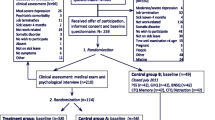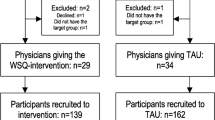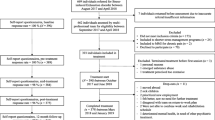Abstract
Purpose
Randomized controlled trials (RCTs) of interventions aimed at reducing work-related stress indicate that cognitive behavioural therapy (CBT) is more effective than other interventions. However, definitions of study populations are often unclear and there is a lack of interventions targeting both the individual and the workplace. The aim of this study was to determine whether a stress management intervention combining individual CBT and a workplace focus is superior to no treatment in the reduction of perceived stress and stress symptoms and time to lasting return to work (RTW) in a clinical sample.
Methods
Patients with work-related stress reactions or adjustment disorders were randomly assigned to an intervention group (n = 57, 84.2% female) or a control group (n = 80, 83.8% female). Subjects were followed via questionnaires and register data. The intervention contained individual CBT and the offer of a workplace meeting. We examined intervention effects by analysing group differences in score changes on the Perceived Stress Scale (PSS-10) and the General Health Questionnaire (GHQ-30). We also tested if intervention led to faster lasting RTW.
Results
Mean baseline values of PSS were 24.79 in the intervention group and 23.26 in the control group while the corresponding values for GHQ were 21.3 and 20.27, respectively. There was a significant effect of time. 10 months after baseline, both groups reported less perceived stress and improved mental health. 4 months after baseline, we found significant treatment effects for both perceived stress and mental health. The difference in mean change in PSS after 4 months was − 3.09 (− 5.47, − 0.72), while for GHQ it was − 3.91 (− 7.15, − 0.68). There were no group differences in RTW.
Conclusions
The intervention led to faster reductions in perceived stress and stress symptoms amongst patients with work-related stress reactions and adjustment disorders. 6 months after the intervention ended there were no longer differences between the groups.





Similar content being viewed by others
References
Ahola K, Toppinen-Tanner S, Seppänen J (2017) Interventions to alleviate burnout symptoms and to support return to work among employees with burnout: Systematic review and meta-analysis. Burnout Res 1:1–11
Arends I, Bruinvels DJ, Rebergen DS, Nieuwenhuijsen K, Madan I, Neumeyer-Gromen A, Bültmann U, Verbeek JH (2012) Interventions to facilitate return to work in adults with adjustment disorders. Cochrane database of Systematic Reviews 2012, Issue 12. Art. No. CD006389. https://doi.org/10.1002/14651858.CD006389.pub2
Bianchi R, Schonfeld IS, Laurent E (2015) Burnout-depression overlap: a review. Clin Psychol Rev 36:28–41
Blonk RWB, Brenninkmeijer V, Lagerveld SE, Houtman ILD (2006) Return to work: a comparison of two cognitive behavioural interventions in cases of work related psychological complaints among the self-employed. Work Stress 20(2):129–144
Borg V, Andersen Nexø M, Kolte IV, Friis Andersen M (2010) Hvidbog om mentalt helbred, sygefravær og tilbagevenden til arbejde (White paper on mental health, sickness absence and return to work). Det Nationale Forskningscenter for Arbejdsmiljø (Danish National Research Centre for the Working Environment), Copenhagen
Carroll C, Rick J, Pilgrim H, Cameron J, Hillage J (2010) Workplace involvement improves return to work rates among employees with back pain on long-term sick leave: a systematic review of the effectiveness and cost-effectiveness of interventions. Disabil Rehabil 32(8):607–621
Cohen J (1988) Statistical power analysis for the behavioral sciences. Lawrence Earlbaum Associates, Hillsdale
Cohen S, Williamsen G (1988) Perceived stress in a probability sample of the United States. In: Spacapan S, Oskamp S (eds) The social psychology of health. Sage, Newbury Park
Cohen S, Kamarck T, Mermelstein RA (1983) A global measure of perceived stress. J Health Soc Behav, 24:385–396
Dalgaard L, Eskildsen A, Carstensen O, Willert MV, Andersen JH, Glasscock DJ (2014) Changes in self-reported sleep and cognitive failures: a randomized controlled trial of a stress management intervention. Scand J Work Environ Health 40(6):569–581
Dalgaard VL, Aschbacher K, Andersen JH, Glasscock DJ, Willert MV, Carstensen O, Biering K (2017) Return to work after work-related stress: a randomized controlled trial of a work-focussed cognitive behavioural intervention. Scand J Work Environ Health 43(5):436–446
De Vente W, Kamphuis JH, Emmelkamp PMG, Blonk RWB (2008) Individual and group cognitive behavioural treatment for work-related stress complaints and sickness absence: a randomized controlled trial. J Occup Health Psychol 13(3):214–231
De Vente W, Kamphuis JH, Blonk RWB, Emmelkamp PMG (2015) Recovery of work-related stress: complaint reduction and work-resumption are relatively independent processes. J Occup rehabil 25:658–668
Furukaxa TA, Noma H, Caldwell DM, Honyashiki M, Shinohara K, Imai H, Chen P, Hunot V, Churchill R (2014) Waiting list may be a nocebo condition in psychotherapy trials: a contribution from network meta-analysis. Acta Psychiatr scand 130:181–192
Goldberg DP, Williams P (1988) A user’s guide to the general health questionnaire. NFER-Nelson, Windsor
Holmgren K, Ekbladh E, Hensing G, Dellve L (2013) The combination of work organizational climate and individual work commitment predicts return to work in women but not in men. J Occup Med 55(2):121–127
Huibers MJH, Beurskens AJHM., van Schayck CP, Bazelmans E, Metsemakers JFM, Knottnerus JA, Bleijenberg G (2004) Efficacy of cognitive-behavioural therapy by general practitioners for unexplained fatigue among employees. Br J Psychiatry 184:240–246
ICD-10 Classification of Mental and Behavioural Disorders. Clinical Descriptions and Diagnostic Guidelines (1992) Geneva: WHO
Johns G (2010) Presenteeism in the workplace: a review and research agenda. J Organ Behav 31(4):519–542
Koopmans PC, Bultmann U, Roelen CA, Hoedeman R, van der Klink JJ, Groothoff JW (2011) Recurrence of sickness absence due to common mental disorders. Int Arch Occup Environ Health 84(2):193–201
Lazarus RS, Folkman S (1984) Stress, appraisal and coping. Springer, New York
Lund T, Labriola M, Christensen KB, Bültmann U, Villadsen E, Burr H (2005) Psychosocial work environment exposures as risk factors for long-term sickness absence among Danish employees: results from DWECS/DREAM. J Occup Environ Med 47(11):1141–1147
Munz DC, Kohler JM, Greenberg CI (2001) Effectiveness of a comprehensive worksite stress management program: combining organizational and individual interventions. Int J Stress Manag 8(1):49–62
National Board of Industrial Injuries in Denmark (Arbejdsskadestyrelsen) (2012) Arbejdsskadestatistik 2011 (Industrial Injuries Statistics 2011) (www.ask.dk)
Netterstrøm B, Friebel L, Ladegaard Y (2012) The effects of a group based stress treatment program (the Kalmia concept) targeting stress reduction and return to work. A randomized, wait-list controlled trial. J Environ Occup Sci 1(1):111–120
Nielsen K, Rasmussen K, Carstensen O, Glasscock D (2008) Forandring som vilkår (Change as a permanent condition). Børsens Forlag, Copenhagen
Nielsen MB, Bultmann U, Amby M, Christensen U, Diderichsen F, Rugulies R (2010) Return to work among employees with common mental disorders: Study design and baseline findings from a mixed-method follow-up study. Scand J Public Health 38(8):864–872
Nielsen MB, Madsen IE, Bultmann U, Christensen U, Diderichsen F, Rugulies R (2011) Predictors of return to work in employees sick-listed with mental health problems: findings from a longitudinal study. Eur J Pub Health 21(6):806–811
Perski O, Grossi G, perski A, Niemi M (2017) A systematic review and meta-analysis of tertiary interventions in clinical burnout. Scand J Psychol 58:551–561
Richardsen KM, Rothstein HR (2008) Effects of occupational stress management intervention programs: a metaanalysis. J Occup Health Psychol 13:69–93
Rohde B (2006) Mange flere patienter har psykiske belastningsreaktioner (Many more patients with reactions to stress). Arbejdsmiljø 3-2006:9–10
Strömberg C, Aboagye E, Hagberg J, Bergström G, Lohela-Karlsson M (2017) Estimating the effect and economic impact of absenteeism, presenteeism, and work environment-related problems on reductions in productivity from a managerial perspective. Value Health 20:1058–1064
Van der Klink JL, Blonk RWB, Schene AH, van Dijk FJH (2001) The benefits of interventions for work-related stress. Am J Public Health 91(2):270–276
Van der Klink JJL, Blonk RWB, Schene AH, Van Dijk FJH (2003) Reducing long term sickness absence by an activating intervention in adjustment disorders: a cluster randomised controlled design. Occup Environ Med 60:429–437
Vänni K, Neupane S, Nygård CH (2017) An effort to assess the relation between productivity loss costs and presenteeism at work. Int J Occup Saf Ergon 23(1):33–43
Willert MV, Thulstrup AM, Hertz J, Bonde JP (2009) Changes in stress and coping from a randomized controlled trial of a three-month stress management intervention. Scand J Work Environ Health 35(2):145–152
Willert MV, Thulstrup AM, Hertz J, Bonde JP (2010) Sleep and cognitive failures improved by a three-month stress management intervention. Int J Stress Manag 17(3):193–213
Willert MV, Thulstrup AM, Bonde JP (2011) Effects of a stress management intervention on absenteeism and return to work—results from a randomized wait-list controlled trial. Scand J Work Environ Health 37(3):186–195
Acknowledgements
This research project was supported by a grant from the Danish Working Environment Research Fund (Grant No. 34-2007-03).
Author information
Authors and Affiliations
Corresponding author
Ethics declarations
Conflict of interest
The authors declare that they have no conflict of interest.
Ethical approval
All procedures performed in studies involving human participants were in accordance with the ethical standards of the institutional and/or national research committee and with the 1964 Helsinki declaration and its later amendments or comparable ethical standards.
Rights and permissions
About this article
Cite this article
Glasscock, D.J., Carstensen, O. & Dalgaard, V.L. Recovery from work-related stress: a randomized controlled trial of a stress management intervention in a clinical sample. Int Arch Occup Environ Health 91, 675–687 (2018). https://doi.org/10.1007/s00420-018-1314-7
Received:
Accepted:
Published:
Issue Date:
DOI: https://doi.org/10.1007/s00420-018-1314-7




